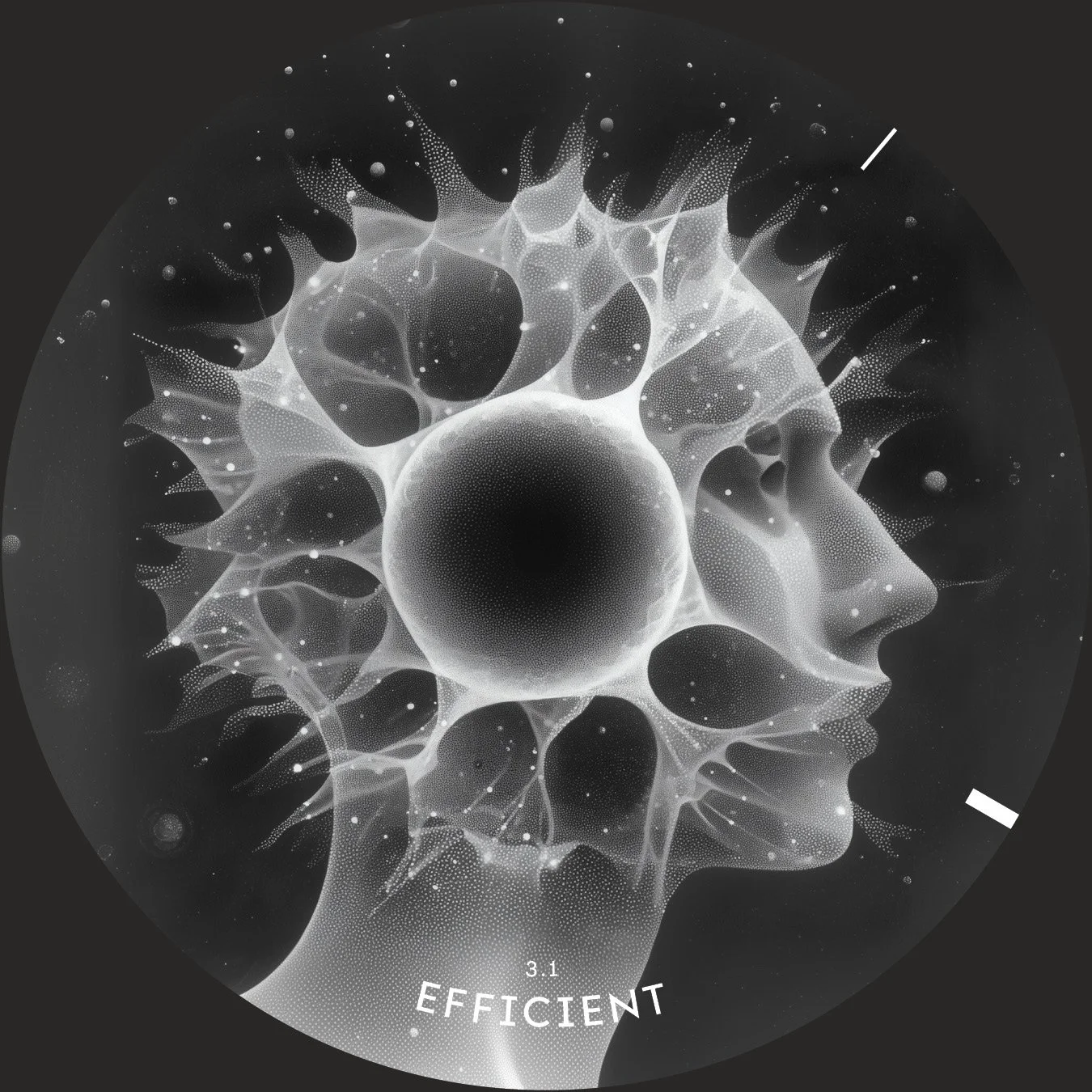Efficient > Effective
The stem “eff-” comes from the Latin prefix ex-, meaning “out of” or “from.” It’s a variant that appears before certain consonants (like “f”), so:
efficere = ex- (“out”) + facere (“to do, to make”)
Meaning: to bring about, to accomplish, to make something come forth
So the “eff-” in effective literally signals an emergence—a movement outward from origin into form.
In other related words:
Effusion = pouring out
Effort = strength exerted outward
Efflorescence = flowering forth
In its purest root sense, "eff-" means something is not just happening—it's becoming visible. It's coming out from the unseen, into the world.
late 14c., "making, producing immediate effect, active, effective," from Old French efficient and directly from Latin efficientem (nominative efficiens) "effective, efficient, producing, active," present participle of efficere "work out, accomplish," from assimilated form of ex "out" (see ex-) + facere "to do" (from PIE root *dhe- "to set, put"). Meaning "productive, skilled" is from 1787. Related: Efficiently.
Modern nuance:
Doing something with minimal waste (of time, energy, resources)
Emphasis on how well the resources are used in achieving a result
The word "efficient"—especially in the sense of "efficient cause"—was crystallized in philosophical usage by Immanuel Kant in the 1787 second edition of Critique of Pure Reason.
📘 1787: Kant’s Use of "Efficient"
Kant used efficient to describe causality—particularly in contrast to other types of cause (like formal or final cause). He builds on Aristotle’s concept of the efficient cause (causa efficiens)—the immediate source of change or motion—but repositions it within his critical philosophy.
In the Critique, Kant argues that human reason cannot know things-in-themselves (noumena), but it can grasp appearances (phenomena) through categories like causality. Here, “efficient” causation becomes central to how we structure experience.
🧠 Shift in Meaning
Kant helped shift efficient from its classical roots (as the “mover”) to a more rational, mechanistic, and empirical lens. This paved the way for its later evolution into the modern idea of efficiency—as in optimization, productivity, and minimal waste—especially during the industrial and bureaucratic revolutions of the 19th–20th centuries.
✨ Summary:
Efficient in 1787: cause that produces an effect (philosophical, metaphysical)
Efficient today: getting the most output with the least input (economic, mechanical)
What we lost: the original focus on force, agency, and origin
What we got: an obsession with speed, output, and systems thinking
Before Kant, the dominant worldview in Western philosophy was shaped by rationalism (e.g. Descartes, Leibniz) and empiricism (e.g. Locke, Hume). These schools argued, respectively, that knowledge came either from pure reason or from sense experience—and both struggled to explain how we could know causality, God, or the self with certainty.
The distortion Kant intended to correct was this:
That the mind is a passive receiver of truth—either through logic alone (rationalism) or sensory data alone (empiricism).
Kant’s radical insight was that the mind actively structures experience. In his words:
“Thoughts without content are empty; intuitions without concepts are blind.”
This meant that:
We don’t just observe causality—we impose the category of causality in order to make sense of experience.
Space, time, and causation are not inherent in things-in-themselves (noumena) but are conditions of human perception (phenomena).
By reframing causality—and thus efficient causes—as something structured by the mind, Kant was not trying to make us more "efficient" in the modern sense. He was trying to rebuild metaphysics on a foundation that recognized the creative participation of consciousness.
His reframing of the “efficient cause” wasn’t about productivity or speed (as later industrial culture would interpret it), but about re-rooting cause itself in the conditions of perception. In short, Kant’s revolution was to say: we are not passive observers of truth—we are co-creators of meaning.
Effective
late 14c., "serving to effect the intended purpose," from Old French effectif, from Latin effectivus "productive, effective," from effect-, stem of efficere "work out, accomplish" (see effect (n.)). Of military forces, "fit for action or duty," from 1680s.
Modern nuance:
Something achieves the intended result, regardless of efficiency
Emphasis on whether the goal is accomplished, not how elegantly
What happened:
As armies became more centralized, bureaucratic, and reliant on logistics, there was an urgent need to measure not just who was enlisted, but who was combat-ready. This led to a shift in terminology:
"Effective soldiers" came to mean those fit for duty—present, armed, and able to fight.
Troops who were wounded, ill, missing, or otherwise unavailable were no longer “effective,” even if they were still technically enlisted.
This administrative redefinition turned "effective" from a qualitative sense of producing an effect (rooted in its Latin origin effectivus) into a quantitative status label: ready, operational, functional.
The deeper shift:
Before this, “effective” had more philosophical and causal weight—something was effective if it brought something into being or manifested power. To be effective was to be causative—to set change in motion, to generate consequence, to act as a source. The word comes from the Latin effectivus, meaning “creative, productive, powerful in execution.” It described the capacity to bring the invisible into form, to translate intention into impact.
In classical thought, especially in Scholastic and Aristotelian frameworks, the “efficient cause” was one of the four core causes of reality—the actual agent that made a thing happen. Effective was not about output per hour or who was ready to be deployed. It was about agency, origin, and transformation. It pointed to the spark that initiates motion—divine will fused with the spark of the individual. What was lost in the bureaucratic redefinition was the soul of the word: its link to creativity, intention, and reality-shaping power. What was once sacred capacity became standardized performance.
The broader cultural consequence?
Effectiveness became synonymous with availability, utility, and output under pressure—a shadow that still haunts how we measure human worth today.
America is obsessed with efficiency—but not always effectiveness.
We build faster highways that lead to traffic jams to get to neighborhoods where people can’t walk to a shop to buy a vegetable. We engineer 10-minute meals that leave us undernourished. We optimize meetings that shouldn’t have happened in the first place.
Efficiency becomes a trap when the speed of the process is prioritized over the quality of the outcome. It feels productive, but it’s just motion—disguised as progress. You can be highly efficient at doing the wrong thing.
Trap:
Obsessed with speed, we streamline everything—until what remains is hollow. We call it progress when the needle moves, even if it's pointing in the wrong direction.
Tell:
You would feel terrible telling someone no, so you use “I’m too busy” as a shield.
You feel drained even when you “accomplish” a mountain of things.
Your to-do list is your lead security blanket.
Alchemy:
Efficiency serves effectiveness—not the other way around.
Ask not how fast—but to what end?
Reminder:
You can be efficient at betraying yourself.
You can be effective by moving slowly, deliberately, toward what matters.
One tiny step in the right direction is better than 1000 in the wrong one.

